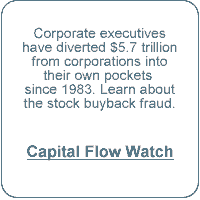Stock Buybacks, Stock Options, and Capital Flows
 Stock Buybacks and Stock Options
Stock Buybacks and Stock Options
Stock Buybacks, Options, and Capital Flows
A corporation cannot invest in itself.
When a corporation buys its own stock, the number of shares outstanding decreases.
Buybacks involve paying cash to shareholders in order that the company may cancel stock, although sometimes repurchased shares are held in treasury.
In either case, the effect is the same as when a bond is called — there are fewer securities in circulation and the company has less cash.
One Trillion Dollars In Buybacks
Between 1980 and 2000, rising stock prices were driven by companies spending more than one trillion dollars to take their stocks off the market, thereby creating a shortage at a time when small investors were buying mutual funds through payroll deductions and 401(k) plans. (See table in Lesson 14)
Fewer stocks and unsophisticated investors drove prices to extreme levels.
With fewer stocks and unsophisticated investors encouraged by tax incentives and their belief in the Common Stock Legend, stock prices were driven to extreme levels.
The scheme worked to the benefit of company executives, fund managers, and especially for Wall Street brokers that, by SEC regulation, were required to act as intermediaries in the trillion dollar buyback movement.
Why Buybacks Are Unfair
Buybacks are unfair and damaging to long-term investors for two reasons.
- First, money that belongs to all investors goes to only a few.
- Second, because buybacks reduce capitalization, the company has diminished long-term capacity to increase earnings, to withstand bad times, and to pay dividends.
Money that belongs to all investors goes to only a few.
There may be a temporary improvement in earnings per share or ROI, but these 'benefits' are illusionary and of no value to long term investors.
A stock buyback program gives corporate assets to only a few shareholders.
The honest way to distribute reserves would be through dividends.
To be fair, repurchases would need to be distributed pro-rata to all shareholders.
Short and Long-Term Goals
American tax authorities deem a fair and equitable distribution to be dividends and subject to higher tax than the capital gains treatment of non pro-rated buybacks.
The main purpose of buybacks, although often disguised by MBA buzz-words and legal gobbledygook, is simply to force stock prices upwards.
This gives value to stock options (a benefit for corporate executives) and enhances the apparent 'performance' of mutual fund managers who control the voting shares of the ultimate beneficiaries — long-term individual investors.
Short-term unrealized gains are no benefit to long-term investors in mutual funds.
At least 80% of investment in equities is long-term.
Mutual fund shareholders holding assets in 401(k) plans cannot liquidate their holdings until retirement without paying a stiff fine.
Consequently, short-term unrealized gains in portfolio value provide no economic benefit to long-term holders of mutual fund shares.
The logical standard of performance would be the end value at which investors cash in their portfolios in fifteen to thirty years, not the temporary market value of their fund shares in the intervening period.
Why Buybacks are Unethical
The fraud inherent in stock buyback schemes is simply that management, supported by fund managers with the voting rights of beneficial owners, use company funds to valorize stock options for their personal gain, ignoring their fiduciary duty to the ultimate owners, and disguising their scheme with false statements and misleading arguments.
Continuation of the buyback fraud depends upon ongoing ignorance of the investing masses.
When Baby Boomers start to cash in their mutual funds after 2012, tort lawyers may find profitable opportunities for action against the directors, fund managers, and investment bankers that have profited so handsomely from corporate buybacks — if the statue of limitations has not yet run and if the miscreant managers are still alive.
Continuation of the buyback / option fraud depends upon the ongoing ignorance of the investing masses.
So far, there are few signs of any glimmering of understanding among those who trust in the SEC to protect their interests and who rely upon Money Magazine (supported by Wall Street ads) as the source of investment wisdom.
However, sooner or later, perhaps when the Baby Boomers begin to draw down their retirement funds, the awakening will come, stocks will return to intrinsic value based on cash payout, and there will be a Great Unraveling on Wall Street that will make Enron and the scandals of the Great Bubble seem small.
Before proceeding, check your progress:
Self-Test
When a corporation buys back its own stock:
|
|
Money to pay for stock buybacks comes from:
|
|
Mutual fund managers like buybacks because:
|
 Stock Buybacks and Capital Flows: continued >
Stock Buybacks and Capital Flows: continued >

